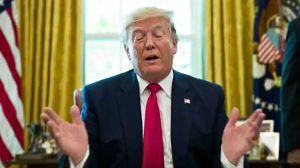Primary Colours of a Presidency
‘‘He was so extremely natural that there was no knowing what his nature was, or what came next.’’ George Santayana on W...

‘‘He was so extremely natural that there was no knowing what his nature was, or what came next.’’
George Santayana on William James
Personality, handsome, endowed with an acute intelligence; a persuasive speaking style; and a god-given ability to turn a die-hard foe into a life-long devotee in seconds. How, then, could such a man get entangled in Monicagate? Why is it so difficult to get a fix on any considerable achievement, which can define his presidency? Was there any substance, or was it just a case of Slick Willie making non-history?
|
Klein wisely eschews the factual approach and instead focuses on key personalities, the policy making process, and the cause for failure or success on issues that engaged the President’s attention The Natural: The Misunderstood Presidency Of Bill Clinton |
Joe Klein, a political analyst and columnist is not new to the subject—personally or professionally. He knew Clinton as Governor of Arkansas, and was perhaps the first to single him out as a future President. A few years ago, as Anonymous, he wrote the best-selling Primary Colors, a fictional take on the Clintons. Klein has now taken on the more daunting task of rendering account of the Clinton Presidency, weighing the pros and cons. The result is a fluent, often funny, and very revealing book, in which Klein is visibly torn between his liking for the man, and his dismay at the failure to achieve greatness.
Klein wisely eschews the factual approach, and instead focuses on key personalities, the policy making process, and the cause for failure or success on issues that engaged the President’s attention. The first of these, of course, was health reform. It encapsulates the failure of Clinton and his policy wonks to understand that the legislative process in a divided executive like that of the US, involves give-and-take. Hillary Clinton’s condescending dismissal of a differing view ensured the defeat of the most complex piece of legislation attempted in the US. And Klein leads us to a startling conclusion-that it was not until 1998, near the fag end of his term, that Clinton learnt how to use the prestige of his Office to get the core of his programmes passed by giving way on non-essentials.
Klein, curiously, misses out on the Clinton Administration’s deft handling of the South Asian nuclear tests and the Kargil War, and treats Russia in a cursory fashion. Then, of course, there was the sordid spectacle of Monicagate, in which virtually everybody comes up smelling of pitch, without exception. Klein squarely puts the blame for the entire episode on not just Clinton’s stupidity, and a hysterical Republican opposition, but also on the press. He points out that no other president had to face the press in a feeding frenzy over scandals-Whitewater, Travelgate, Monicagate-on which billions were blown, and which died with a whimper. Klein tries hard to find a legacy for Clinton, but dragging ‘‘Washington towards a recognition that a revised form of government activism might be appropriate in the anarchy of an instant economy’’ sounds simply hollow.
Klein observes that ‘‘Bill Clinton often seemed the apotheosis of his generation’s sins: moral relativism, the tendency to pay more attention to marketing than to substance.’’ Actually, Clinton reflected the shallowness of character that marks politics and politicians. Devoid of any moral values as its core or touchstone, politics is seen as excess partisanship and scoring brownie points. That’s why; given his ruddy health, Clinton may one day see a history of his years in office with a sad epitaph that would read: A President Without Values.
Photos




- 01
- 02
- 03
- 04
- 05



























